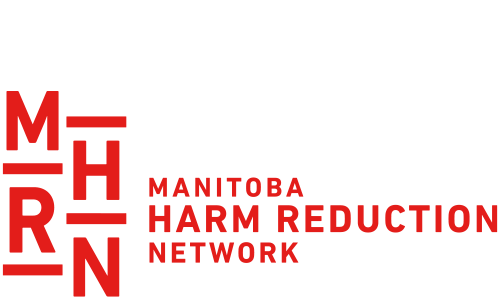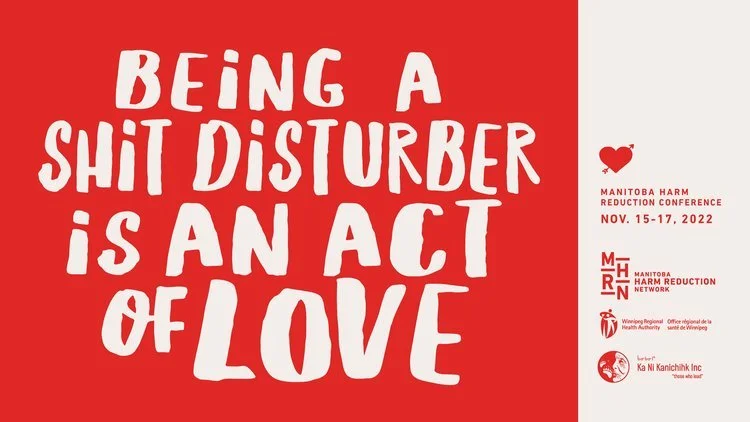Tuesday, November 15th, 2022
Opening Ceremony — 9:00
Location: Ballroom
Leslie Spillett
Leslie Spillett will open the conference with a pipe ceremony, at 9am on Tuesday, November 15.
Protocol
We will honour everyone's ceremonial protocols during the opening pipe ceremony so those who wish to wear skirts please do so. For our relatives who may be attending ceremony for the first time, we welcome you into this ceremony with our hearts wide open - just come as you are, whatever your attire is completely acceptable. Love transcends protocol, every time.
Being a shit disturber is an act of love — 10:45am - 12:00pm
Location: Ballroom
Dr. Marcia Anderson
To Be Announced
PANEL: Community Responses to drug poisonings & overdoses — 1:00 - 2:15
Location: Ballroom
Jonny Mexico & Dawn Lavand: Don't miss your shot - hit the pop up spot
Last September, in the wake of skyrocketing deaths due to poisoned drug supply, the Winnipeg Harm Reduction Network decided to open up a pop up overdose prevention / response site in Winnipeg’s Main Street area. The action was led by peers with support from the harm reduction community - This presentation will highlight the planning, implementation and lessons learned from this event, as well as showcase the steps that were taken to make this unauthorized OPS a success.
Levi Foy
To be announced
Veda Koncan, Chase Gammon & Wanda Scott: Manitoba Satellite Supply Distribution Sites
We will talk about best parts and the hardest parts of running satellite sites in Manitoba, and what people who use drugs think we should do next.
Panel: Culture as Intervention in Substance Use, Making Ceremony Inclusive for PWUD — 1:00-2:15
Location: La Verendrye
Dana Connolly
This panel will hold discussions on stories of inclusion, the harms of exclusion and how to make space for PWUD in ceremony.
Tasha Spillett
In her contribution to the panel Tasha will share key findings and reflections from her PhD dissertation titled, From the Roots Up: (Re)Making Indigenous Women and Two-Spirit Peoples’ Relationships with Land. Tasha will also share examples of her creative writing work to demonstrate the importance of knowledge mobilization in the remaking of community.
Cecil Sveinson
In this session, Cecil will share how he and his family have tried to make space for PWUD in accessing and attending ceremony.
Gigii-Bapiimin: The Impacts of COVID-19 Pandemic on The Health and Wellbeing of Indigenous People Living with HIV — 1:00 - 2:15
Location: Gateway
Melissa Morris & Ann Favel
Gigii-Bapiimin is a community-based, qualitative, Two-Eyed Seeing project (2022-2024) which
examines the impacts of COVID-19 on the health and wellbeing of Indigenous people living with
HIV (IPHA) in Manitoba and Saskatchewan, including IPHA with lived experience of substance
use. This presentation will discuss the preliminary findings regarding pandemic’s impacts on
culture, ceremony, land-based activities, and service access for IPHA. IPHA will also highlight
the lessons from the responses to the HIV epidemic, which can be applied in managing and
responding to the impacts of COVID-19. Recommendations will be provided for effective and
culturally safe harm reduction services, health initiatives, interventions, and policy to support
IPHA in MB and SK in managing and responding to the COVID-19 pandemic.
Panel: Parents who use drugs have the right to parent their children — 2:45 - 4:00
Location: Ballroom
Dr. Heather Watson: Planting Seeds, Growing Agency
An overview of the grassroots efforts of Manitoba iMAPLES, and interprofessional team of clinicians,
researchers, educators and advocates who work to champion for dignified, family centred care for those with substance involved pregnancy.
Melissa Sveinson & Candace Neumann: Zaagiidiwin: caring for our relatives
In this presentation we will share how Indigenous birth workers provide flexible, culturally rooted, compassionate support to families who use substances throughout pregnancy, birth, and the postpartum
Helene San Pedro-Estrada: STAR Program (Success Through Advocacy & Role-Modeling)
Success Through Advocacy & Role-Modeling, or the STAR Program, is an FASD Prevention program that provides supports for women of childbearing years who live in First Nations on-reserve communities in Manitoba through person-centered, strength-based and harm reduction approaches. As an FASD prevention program, the overall goal of the STAR Program is to prevent prenatal exposure to alcohol and/or substances in future children born to pregnant parents at risk of using substances during pregnancy. The STAR Program supports 18 First Nations on-reserve communities in Manitoba, with program development and expansion to 11 more communities in the most northern reserves currently underway. Program delivery approaches is unique in different communities to address needs and allow for community strengths. As a regional/ provincial program, the STAR Program focuses on health promotion, home visiting, mentoring and role-modeling, integrating culture/ traditions into care, and case management that will assist in our program participants’ goals to have a safe and healthy environment and improved quality of life for themselves and their (future) children.
Panel: Indigenous Harm Reduction — 2:45 - 4:00
Location: La Verendrye
Jason Klainchar & Donald Knezacek
The Churchill Health Centre’s Warrior Caregiver Program provides land based mental health supports to men in the community. The successful partnership with Movember has integrated a model of peer support into the community. Our programming presents a “menu” of community resources available to everyone to help support mental health and addictions recovery.
Jordy Ironstar
Each of our communities has a fire – the fire of health and wellbeing – that need to be tended and cared for so that our people can thrive. But often when a health issue becomes apparent, we don’t even know where to start. The Keeping Our Fires training from CAAN (formerly known as the Community Readiness Training) is designed to be used by any community by focusing on the strengths of that community, the next steps needed to foster community-based change, and create a roadmap developed by and specific to your own community.
Tahl East: FIRE with FIRE - a peer led, in community, harm reduction project.
Harm reduction has become one of the most contentious topics across SERDC’s 8 first nations. Peer involvement of people who used drugs/use drugs within harm reduction services is widely promoted yet under-utilised. Often due to several barriers there is a limited understanding of the roles, impacts, contexts, and mechanisms for peer involvement, particularly in in-community/on reserve settings.
FIRE with FIRE is introducing the peer concept of "harm reduction" as an approach that seeks to bridge the gap between opposing philosophical/moral positions to maximize the benefits of peer connection, allyship and mentorship for substance users, families, and communities. The project will minimize the harm created through misperceptions, stigmatizing language, accidental drug poisoning and death of our relatives.
FIRE with FIRE is a community level intervention that regardless of the label applied to it is a comprehensive system of supports for minimizing the harms to our people. Utilizing a two eyed seeing approach, the project focuses on life preserving practices led by peers within each community.
Healing Inner Voices: A Peer-Led Indignous Film Collaborative 2:45 - 4:00
Location: Gateway
Martin Morberg
Through the lived experiences and voices of eight Indigenous people living with HIV, this poetic short documentary combines storytelling and the healing power of Indigenous culture to reflect on the realities of stigma and discrimination for Indigenous people.
Offering inspiration and empathy, the film offers up hope that understanding and compassion will decrease experiences of HIV stigma and discrimination. Most importantly, it will be a way to connect those who made it and those who will watch it, to community, and to culture.



